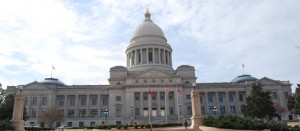By Steve Brawner
© 2016 by Steve Brawner Communications, Inc.
The big news in health care this week was that most of the state’s insurers are asking for rate increases for policies purchased individually or through the state’s Arkansas Works program.
The bigger issue – rising health care costs, and the political system’s inability to address them – is not new.
The two Blue Cross providers are asking for 14.7 percent increases, while QualChoice Life and Health and QCA Health Plan are asking for increases of just under 24 percent. The state’s fifth insurance company, Ambetter, is asking for less than 10 percent and is not required to publicly disclose or justify that amount. The sixth insurance company, UnitedHealthcare, unable to make a profit, is leaving the market.
The Arkansas Insurance Department still must approve the requests. Commissioner Allen Kerr sounded skeptical in a statement released by his office.
There are many reasons for the requested hikes. I’ll summarize those given by Arkansas Blue Cross spokesperson Max Greenwood. Patients are using more health care than expected. Costs are rising, particularly for prescription drugs and catastrophic claims of more than $50,000. The Affordable Care Act’s transitional reinsurance fee, which offset higher cost enrollees, is going away.
One other factor pertains to Arkansas Works, the program formerly known as the private option that uses federal funds to purchase private insurance for lower-income Arkansans. Remember last year when we learned many people living out of state, or not living at all, were being covered? When that was more or less fixed, Blue Cross lost a population of 25,000 members whose premiums were being paid but who didn’t use much health care, especially the dead ones. So now the insurer says it has to adjust.
Of course this all happens in the context of Obamacare. Sen. Tom Cotton, Rep. French Hill and Rep. Bruce Westerman released statements calling once again for the Affordable Care Act to be repealed and replaced with patient-centered reforms.
That’s easier to say than do. Since the Affordable Care Act was signed into law more than six years ago, congressional Republicans have voted dozens of times to repeal it. Replacing it? Not so much. True, Rep. Tom Price, R-Ga., a physician, has been offering alternative bills since 2009, and Donald Trump’s website lists a framework of reforms. But the party has never coalesced behind a detailed, specific plan and then spent political capital selling it to the American people. Instead, it’s mostly just voted to repeal Obamacare knowing that, ultimately, President Obama would veto the repeal anyway.
Health care is by far the most difficult issue facing policymakers. There are many reasons, including that it’s a service Americans believe should be unlimited and cheap, which is a high standard. We need health care like we need groceries, but with food, most of us want steak but will buy canned tuna if that’s all we can afford. With health care, we all want nothing less than steak, but at canned tuna prices.
Like any other service, someone has to pay for a health care provider’s costs, and there are only three imperfect ways to do that. One is the free market approach where the consumer pays, which offers more freedom but less security and doesn’t have a clean answer when the consumer can’t afford the care. Another way is for the government to pay, which offers more security, at least initially, but less freedom. In that case, the government is deciding how life and death resources are allocated. Then there’s the third approach: Someone else pays, typically an insurance company. That method tries to strike a balance between freedom and security but gives a lot of power to a private corporation and in recent history has not effectively controlled costs.
The American health care system was a convoluted concoction of those three payment methods before Obamacare, and it still is. Prices were rising before Obamacare, and they still are. Undoubtedly, more Americans have insurance now than they did, and that’s a positive that shouldn’t be ignored. But many still are uninsured, and the big problem – cost – has not nearly been solved.
Republicans at the national level would do well to follow the example set by Republicans in Arkansas, who have done most of the creating, amending, defending and opposing of the aforementioned private option/Arkansas Works.
We can debate whether Arkansas Works is a good idea. But at least it’s a new one, with specific details that are clearly communicated and fought for.
Related: The real goal of the private option: Changing U.S. health care


